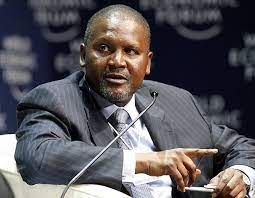There are 54 countries in Africa. More than 20 produce oil, and five of these countries are part of the world’s 30 oil-producing countries. However, only two countries in Africa do not import oil.
In 2019 Africa accounted for more than 7.9 million barrels of oil produced per day, which was about 9.6 per cent of global output. But between 2005 and 2010, however, oil production in Africa was at its peak of nearly 10 million barrels per day.
Speaking on Sunday June 18, 2023 at the opening of the 30th Anniversary of the Afreximbank Annual Meetings in Accra, Ghana, the businessman, Aliko Dangote, pointed out that only two countries, Algeria and Libya, do not import oil.
Dangote was speaking about the importance of free movement and intra-Africa trade. He said: “We are importing poverty and exporting jobs.” He said that in relation to the fact that African countries continue to export raw materials.
He also expressed concern about the difficulty in travelling around the continent. He said being in possession of the African passport, he should be able to travel around easily. But there are two countries that for whatever reasons do not recognise the African passport.
According to Dangote, Nigeria produces about six million tons of urea and therefore, Africa should not be seeking to import fertilizer from outside the continent.
Dangote shared his experience on how his company started producing cement for local consumption and export, as well as opening factories in other countries, and urged the establishment of local domestic banks that would invest in businesses on the continent.
In his welcome address, the Governor of the Bank of Ghana, Dr Ernest Addison gave tribute to Afreximbank.
He said since its establishment three decades ago, Afreximbank has transitioned into a first-class supranational financial institution, championing African trade and driving growth across multiple sectors in Africa.
“Evidence of the bank’s interventions are numerous and includes infrastructural investments to support intra-African trade, investments in agriculture and industry, trade facilitation, trade guarantee and advisory services, and country specific programmes to support those in dire economic situations, among others,” he said.
He indicated that Afreximbank has also introduced platforms designed to improve and facilitate trade in Africa, including the MANSA repository platform, the Pan African Payments and Settlements Systems (PAPSS), and the Intra-African Trade Fair (IATF).
Dr Addison stated further that the establishment of Afreximbank’s Trade Impact Mitigation Facility platform, where the Bank intervened during the COVID-19 pandemic, and disbursed over $8 billion to central banks and commercial banks to avert looming trade debt payment defaults. Part of this funding also went into the procurement of test kits, PPEs and other COVID-19 containment materials in Member States.
“The Bank also disbursed over $5 billion to Member States and businesses towards the procurement of food, fertilizer and grains as the Russian-Ukraine crisis unfolded. Working with UNECA, the AU, and the AfCFTA Secretariat, Afreximbank created a pooled procurement platform termed as the Africa Trade Exchange (ATEX) to help African countries procure grains, edible oils and fertilizers at reduced costs.
“Prior to the implementation of AfCFTA in 2021, Afreximbank disbursed over $20 billion in support of intra-African trade and investments and projected to double this to $40 billion by end-December 2026,” he said.
The Afreximbank 30th Anniversary Annual Meeting was celebrated under the theme: “Delivering the Vision, Building Prosperity for Africans”.


